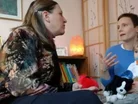Study says Canadian kids take alternative therapies, doctors are not aware

Researchers have said that a growing number of Canadian children with chronic illnesses are being treated with complementary medicine but the parents do not always tell the doctors that they are using alternative therapies.
The researchers said, informing health-care providers regarding vitamins, herbal and homeopathic remedies is vital as in some cases they can adversely interact with traditional medications.
In a survey of parents, having their children treated at 2 Canadian pediatric hospitals, the researchers have found that alternative medicines and such therapies as massage and chiropractic were commonly used.
At Stollery Children's Hospital in Edmonton, 71%of parents surveyed said they treated their kids with complementary medicine, while 42% of parents attending the Children's Hospital of Eastern Ontario (CHEO) in Ottawa reported their use.Pediatrician Dr.
Sunita Vohra, co-principal author of the study said, “Our study found that many, many children use complementary therapies, and unfortunately oftentimes parents do not necessarily disclose this use when they're talking to their child's health-care team."
The study involved a total of 926 families at 10 different clinics in Edmonton and Ottawa, with parents asked to fill out an anonymous questionnaire in the waiting room prior to their child's appointment.
The most common complementary medicines used were multivitamins or minerals, herbal products and homeopathic remedies, while the most often-used alternative therapies were massage, chiropractic, relaxation and aromatherapy. Almost half reported using forms of complementary remedies at the same time as being treated by conventional medicine, while about 5% said they used such alternative therapies instead of standard medicine.
The study also found that about 56% of respondents were treating their youngsters with alternative forms of medication at the same time as they were taking prescription drugs. The study also found that more than 60% of parents reported getting information about complementary medicine from "family."
The study suggests that families want doctors and other health providers to ask about the use of complementary medicine, and they want a reliable source of information about their potential benefits and harms.



